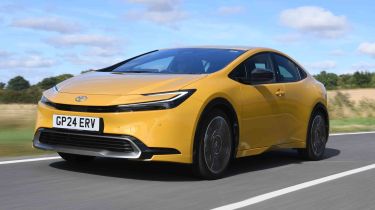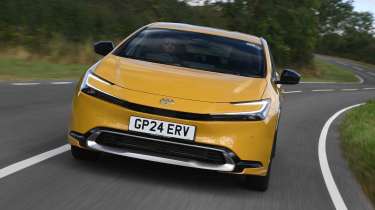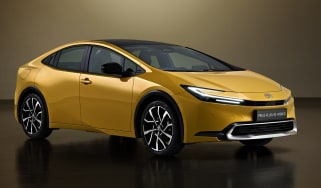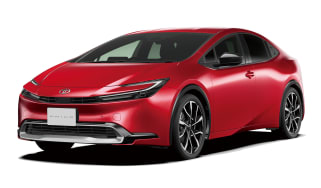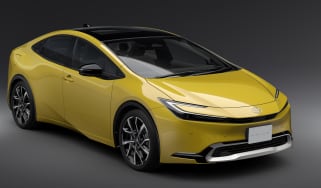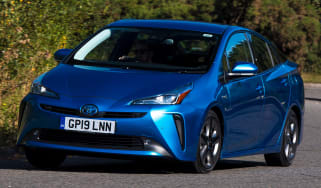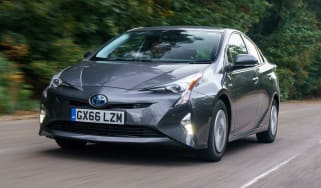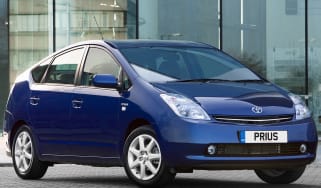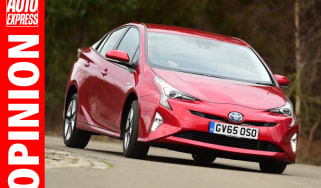Toyota Prius review
Sharp looks are matched by the best-ever driving experience to be found in a Prius

Is the Toyota Prius a good car?
Ever since the first Toyota Prius arrived in 1997, over five million examples have been sold, and at one point, it even became a Hollywood must-have as celebrities tried to boost their green credentials thanks to this car’s fuel efficiency.
After a brief period away from the UK order books, the fifth-generation Prius arrived in plug-in hybrid form, sporting sharper looks than any of its predecessors and giving this latest version real kerb appeal. Going plug-in hybrid means the Prius no longer steps on the toes of the hybrid Toyota Corolla and Toyota C-HR, both of which share the same TNGA platform as the Prius.
Apart from having to plug in to recharge the battery, the rest of the tech is familiar to other Toyota models: an efficient four-cylinder engine, an electric motor, and a hybrid system that provides all-electric driving when needed. The Prius is only available in two trim levels, Design and Excel, and both cost less than £40,000. That avoids the higher-rate luxury car tax, but means the Prius is significantly more than previous versions of Toyota’s economy car.
| Key specs | |
| Fuel type | Plug-in hybrid |
| Body style | Five-door hatchback |
| Powertrain | 2.0-litre four-cylinder petrol + electric motor |
| Safety | N/A |
| Warranty | 3yrs/60,000 miles (up to 10yrs/100k miles with routine franchised dealer servicing) |
How much does the Toyota Prius cost?
Since the Toyota Prius is now only sold in the UK as a plug-in hybrid, prices have seen a significant hike over past models. The entry-level model comes in at just under £37,500, which is £5,000 more than the price of the old Prius Plug-in that went off sale in 2023. That car was the priciest version of the old Prius, too, so the new model is a big step up from the old hybrid.
Used - available now

2018 Toyota
Prius
48,201 milesAutomaticPetrol1.8L
Cash £13,490
2020 Toyota
Prius
50,351 milesAutomaticPetrol1.8L
Cash £17,800
2020 Toyota
Prius
44,951 milesAutomaticPetrol1.8L
Cash £19,942
2018 Toyota
Prius
52,000 milesAutomaticPetrol1.8L
Cash £12,500There are two trim levels to choose from, and their Design and Excel names are familiar from elsewhere in Toyota’s line-up. The Excel commands a premium of more than £2,500 over Design, but at the moment, it narrowly slides under the £40,000 mark, avoiding the luxury car premium for road tax.
Both versions of the Prius Plug-in use the same powertrain, which comprises a 2.0-litre petrol engine and an electric motor that makes a combined 220bhp. The battery is a modest 13.6kWh in size, while Toyota’s CVT-style automatic gearbox handles power distribution between the engine, motor, battery and front wheels.
Engines, performance & drive
The second generation of Toyota’s TNGA platform is used for the Prius Plug-in, and that means not only is the car just as comfortable around town (provided you go for the entry-level Design with its smaller 17-inch wheels) as it is on the motorway, but it’s also quite enjoyable to drive. The steering feel is reassuring, while the body control in corners is impressive. The engine can sound a little gruff when accelerating hard, and there’s a bit of road noise at higher speeds, but it’s not a deal breaker. Read more about the Toyota Prius’s engines, performance and drive…
MPG, emissions & running costs
With more than 25 years of hybrid development behind it, the latest Toyota Prius Plug-in offers great efficiency. The battery is relatively modest when compared with some plug-in hybrid rivals, but the car’s slippery shape means there is a possible range of around 53 miles (depending on wheel size) from a full charge. Even better than that, the Prius should continue to be efficient once the battery has run down, with 80mpg easily achievable in normal driving without a fully charged battery. Read more about the Toyota Prius’s MPG, emissions and running costs…
Interior, design & technology
There are design elements within the Toyota Prius that are shared with the C-HR compact SUV, but the low-slung body means overall it looks unlike any other model in the Toyota line-up. Inside, it’s very much business as usual, though, with Toyota’s latest infotainment tech, decent build quality and a cabin layout that’s easy to get along with once you’re used to it. Read more about the Toyota Prius’s interior, design and technology of the…
Boot space, comfort & practicality
The low-slung shape of the fifth-generation Prius means that the in-car packaging has taken a hit, with rear headroom compromised by the car’s low roof. Boot space is better than in the previous-generation Prius, but it’s still not great because the high floor and low roof create a shallow load space. Read more about the Toyota Prius’s boot space, comfort and practicality…
Reliability & safety
The fifth-generation Prius hasn’t been subjected to scrutiny from safety experts Euro NCAP yet, but seeing as it shares its platform and electronics with cars such as the five-star-rated Toyota C-HR, we would expect it to perform just as capably to avoid or mitigate a collision. Toyota ranked eighth in the latest 2024 Driver Power customer satisfaction survey, with two of its best-selling models in the top 10 of the best cars to own list, and we anticipate that the Prius will be equally dependable. Read more about the Toyota Prius’s reliability and safety…
Toyota Prius alternatives
The Prius has tended to carve its own niche in the market, and the fifth generation’s swoopy styling means it looks unlike any other medium-sized family hatchback on sale. Its closest rivals are plug-in hybrid versions of the Kia Niro and Hyundai Kona, while more conventional hatchbacks such as the Volkswagen Golf, Vauxhall Astra, Peugeot 308 and Cupra Leon or SEAT Leon with plug-in powertrains are available for a similar price.
Frequently Asked Questions
Toyota suggests a service period of 12 months or 10,000 miles, in line with the serviced-activated additional warranty schedule.

